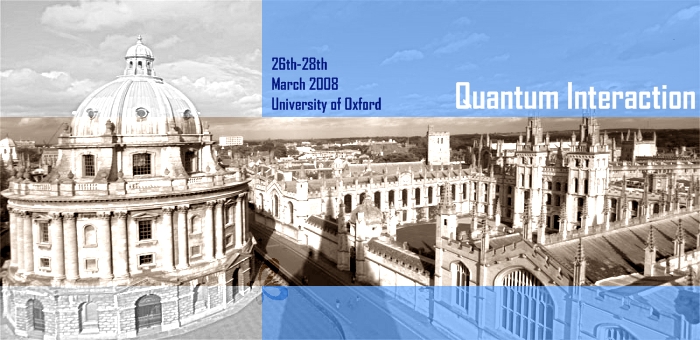::programme
DAY 1 (26 March)
Session 1 : Keynote Speaker (9.00am - 10.00am)
Quantum Reality Unveiled Through Process and the Implicate Order
Prof. Basil Hiley (Birkbeck College, University of London)
Morning Coffee (10.00am – 10.30am)
Session 2: Foundations of quantum interaction I (10.30am – 11.30am)
Why Quantum Theory?
K. Kitto (Queensland University of Technology, AUS)
Artificial Intelligence and Nature's Fundamental Process
P. Marcer and P. Rowlands (University of Liverpool, U.K.)
Lunch (11.30am-1.30pm)
Session 3: Foundations of quantum interaction II (1.30pm – 3.00pm)
When is a set of data best described by a quantum (like)
theory?
S. Aerts and D. Aerts (Brussels Free University, Belgium)
Formula of total probability, interference, and quantum-like
representation of data for experiments on disjunction effect
A. Khrennikov (Växjö University, Sweden)
A Causal Agent Quantum Ontology [slides]
K.B. Laskey (George Mason University, USA)
Afternoon Coffee (3.00pm-3.30pm)
Session 4: QM and Finance (3.30pm – 4.30pm)
Quantum Mechanics and Option Pricing
B. E. Baaquie (National University of Singapore)
Bohmian mechanics in the mechanics of option pricing
E. Haven (University of Leicester, U.K.)
Welcoming drinks (4.30pm – 7.30pm)
Session 5: Grant possibilities and international networks (5.00pm – 6.00pm)
DAY 2 (27 March)
Session 6: Keynote Speaker (9.00am - 10.00am)
Quantum Dissipation, Classicality and Brain Dynamics
Prof. Giuseppe Vitiello (Dipartimento di Matematica e Informatica and Instituto
Nazionale di Fisica Nucleare,
Universita' di Salerno, Italy)
Morning Coffee (10.00am – 10.30am)
Session 7: QM and cognition I (10.30am – 11.30am)
Distinguishing quantum and Markov models of human decision
making
J.R. Busemeyer, E. Santuy (Indiana University, USA) and A. Lambert-Mogiliansky
(Paris-Jourdan Sciences Economiques, France)
Partially Coherent Quantum Models for Human Two-choice
Decisions
I.J. Fuss and D.J. Navarro (University of Adelaide, AUS)
Lunch (11.30pm – 1.30pm)
Session 8: QM and cognition II (1.30pm – 2.45pm)
Decision-Making under Non-classical Uncertainty
V.I. Danilov (Central Economical Mathematical Institute, Russia) and A. Lambert-Mogiliansky
(Paris-Jourdan Sciences Economiques, France)
Projective expected utility
J. La Mura (Leipzig Graduate School of Management, Germany)
[position] The inverse fallacy and quantum formalism
R. Franco (Institute for Scientific Interchange Foundation, Italy)
Afternoon Coffee (2.45pm – 3.00pm)
Session 9: QM and algorithms (3:00pm – 4.30pm)
Prospective Algorithms for Quantum Evolutionary Computation
D. Sofge (Naval Research Laboratory, USA)
The mechanics of information
K. Martin (Naval Research Laboratory, USA)
Local Quantum Computing for Fast Probably MAP Inference
in Graphical Models
C. Fox, I. Rezek, and S. Roberts (University of Oxford, U.K.)
Session 10: Panel Discussion (4.30pm – 5.30pm)
“What have Birkhoff and von Neumann done for us over the past 70 years?”
Moderator: P. Bruza
Panelists [TBC]:
Prof. J. Busemeyer (Indiana University)
Dr. B. Coecke (University of Oxford)
Dr. K. Engesser (University of Konstanz)
Prof. C.J. van Rijsbergen (University of Glasgow)
Dr. D. Widdows (University of Oxford)
Conference Dinner (Keble Hall, 7pm –)
DAY 3 (28 March)
Session 11: QM and Meaning (9.00am – 10.00am)
Entangling words and meaning
P.D. Bruza, K. Kitto (Queensland University of Technology, AUS), D.L. Nelson
and C.L. McEvoy (University of South Florida, USA)
Semantic Vector Products: Some Initial Investigations
D. Widdows (Google)
Morning coffee (10.00am – 10.30am)
Session 12: QM and Meaning II (10.30am – 11.30am)
A Compositional Distributional Model of Meaning
S. Clark, B. Coecke and M. Sadrzadeh (University of Oxford, U.K.)
Quantum Collapse in Semantic Space: Interpreting Natural
Language Argumentation
P.D. Bruza (Queensland University of Technology, AUS) and J.H. Woods (University
of British Columbia, Canada)
Session 13: QM and Information Retrieval (11.30am-12.45pm)
On quantum statistics in data analysis
D. Pavlovic (University of Oxford, U.K.)
Towards modeling implicit feedback with quantum entanglement
[slides]
M. Melucci (University of Padua, Italy)
[position] Characterising through Erasing
A.F. Huertas-Rosero, L.A. Azzopardi and C.J. van Rijsbergen (University of
Glasgow, Scotland)
Lunch (12.45pm – 2.30pm)
Session 14: QM and Complex Systems (2.30pm – 3:30pm)
Toward a classical (quantum) uncertainty principle of
organizations
W.F. Lawless (Paine College, USA)
[Position] Quantum Mechanical Basis of Vision
R. Chakravarthi (New York University, USA) and A.K Rajagopal (George Mason
University, USA)
[Position] Graphical human interfaces for quantum interaction
H.T. Goranson (EchoStorm Inc., USA)
Afternoon Coffee (3.30pm-4.00pm)
Session 15: Closing Discussion (And drinks?) (4.00pm – 5.00pm)
Relevant Topic Areas
The symposium will present research dealing with the use of concepts taken from the general body of research in QM on the physical, epistemological, mathematical or philosophical levels and applied to modeling and better understanding phenomena in the following areas:
-Language, Linguistics
-Logic, Artificial Intelligence
-Cognition, Brain (memory, cognitive processes, neural networks, consciousness)
-Information Processing and Retrieval
-Biological, Complex Systems
-Political, Cultural, Psychological or Social Sciences, Social Interaction
-Finance, Econophysics
-Organizations (mergers, corporate cultures, decision-making)
-Other (specify)
Submission Guidelines
Potential participants are invited to submit either a FULL paper (up to EIGHT pages), or a POSITION paper (up to FOUR pages). Each submission will be judged by at least two referees on technical merit and its potential to provoke active discussions.
Submissions, in PDF format, should be sent no later than 31 October 2007 to p.bruza@qut.edu.au using the subject line "QI-2008 Submission". In the email you should specify if you intend it to be a FULL or POSITION paper. All submissions should conform to the AAAI style format.
Typesetting instructions can be found at: http://www.aaai.org/Publications/Author/formatting-instructions.pdf
Further notes for authors can be located at : http://www.aaai.org/Publications/Author/author.php
The organizers are considering having
a number of accepted papers expanded and revised for possible inclusion in
a special journal issue or in a book volume.
